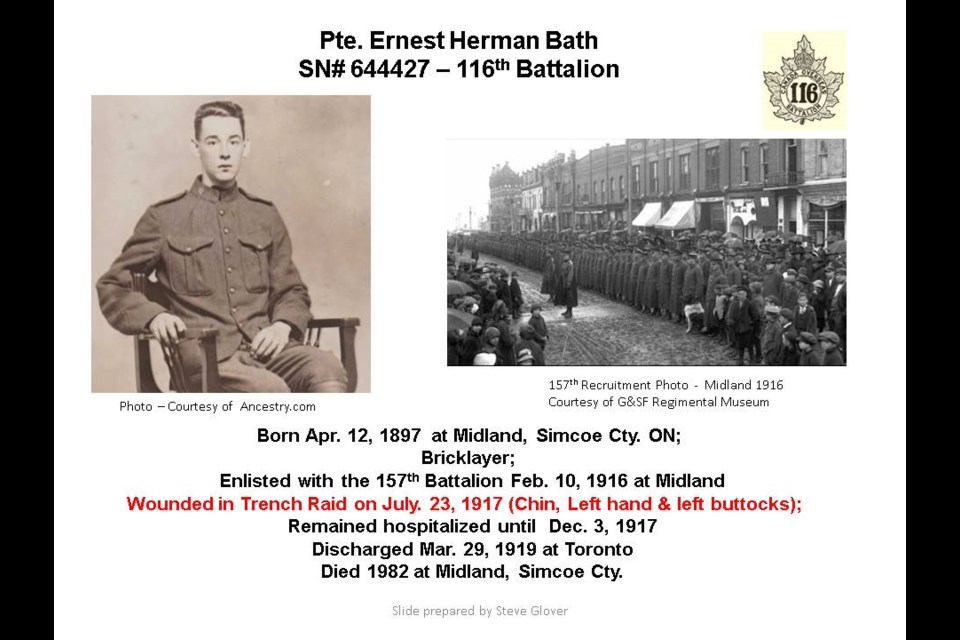Today marks an important anniversary in Midland and Orillia’s military history.
It was on this day back in 1917 that a company of 200 young men from each locale took part in a trench raid against German infantry as part of the 116th Battalion (Ontario County Regiment).
And Steve Glover wants to bring attention to this important time in the region’s military history.
The Barrie Legion public relations officer and “so-called” branch historian has been researching the raid that for “many of them was their first time in battle.”
Glover began looking into the raid during the pandemic and discovered that potentially 400 of the 700 men involved in the raid had enlisted with the Simcoe County 157th Battalion and were transferred in December 1916 to the larger 116th.
“The majority of these men were from the Orillia and Midland companies,” he said, noting 400 soldiers from the group were held back as is often the case during battles like this one. “We did make a difference.”
Glover said the raid was a “setup” for a subsequent larger military battle in Lens, France called Hill 70.
“It was a diversionary thing to bring the Germans away from Hill 70,” Glover told MidlandToday.
“It was one of the largest trench raids. In the scheme of things, it’s just another battle, but for the Simcoe County guys, this was the first time they ever went into battle.
“This was also the first time in World War I that a good percentage of Simcoe County boys were going into battle and fighting together.”
Glover joined the Barrie Legion more than a decade ago to honour his great uncle Sgt. Fred Glover, who was killed in August 1918 and his father Gnr. Alex Glover, who served with the Canadian 5th Armoured Division during World War II and survived.
He added: “I was not originally from Simcoe County, but through my volunteer activities with the G&SF (Grey & Simcoe Foresters) Regimental Museum I soon learned a great deal about the history of the Simcoe County Regiment.”
Glover said while many remember the anniversary of 1917’s Battle of Vimy Ridge on April 9 every year, it’s important to mark other important World War I battles and the Canadian men who gave the ultimate sacrifice for their country.
“General Sir Arthur Currie had taken over the Canadian Corp command in June, 1917 from General Sir Julian Byng and wished to force the enemy to remove some of their strength from the Hill 70 area to reinforce the trench areas near Avion,” Glover said.
“The raid was considered a success with some 60 enemy prisoners taken and a large number of enemy casualties. There were over 70 casualties with the 116th out of approximately 700 ‘raiders.’”
And while some local men perished in the 1917 trench raid, others returned home, including Oliver Smith, who went on to become mayor of Midland.
Glover noted that former Ontario Premier Leslie Frost was an officer with the 157th at the start of the war and wrote about the raid in his book Fighting Men.
“His book references a number of the men from the Orillia area who took part in the raid and records the story of several who received special decoration for their part in the raid.”
In an exerpt from the book, Frost records a letter from an unnamed Orillia soldier with the 116th to his mother about the raid.
“No doubt you have heard about our raid,” he writes. “On the 22nd and 23rd of July, at 1 a.m. we made a big raid. We were ordered to raid on the German front lines, with two objectives, on a frontage of 600 yards, to a depth of 400 yards.
“The ground was exceedingly difficult. In fact, (our) Lieutenant, who comes from near Woodville and is with the Battery of Artillery, has been out here in France for over 16 months, and he stated that it was the most difficult position he had ever seen a Battalion asked to attack.”
The soldier goes on to recount how the area surrounding the battleground was filled with shell holes, decrepit houses, barbed-wire entanglements, brick piles, a big slag heap on the left, and a maze of German trenches on the right.
“The final objective was over a railway embankment, twenty feet high,” he wrote to his mother. “In addition to that there was a sunken road just in front of our jumping-off place.
"This was strongly fortified with barbed wire, and to add to our difficulties, the Germans made a gas attack, just as the troops were assembling and it looked at one time as though the raid would have to be called off, but the men put their gas helmets on and went over like old veterans.”



